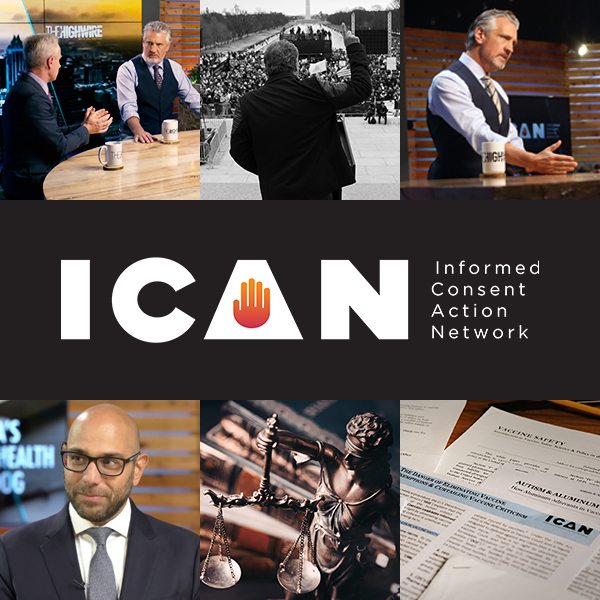

Over a year ago, ICAN submitted a Citizen Petition to the FDA on June 17, 2020 requesting that all Phase II and III COVID-19 vaccine trials include a placebo control group, that the placebo should be a saline injection without anything added, and that the placebo control group be at least equivalent in size to the experimental group.
ICAN’s petition and follow-up correspondence also requested that the FDA confirm the placebo control group would be maintained through the conclusion of the trial in order to maintain the integrity of the clinical trial and the validity of the safety data produced by the clinical trial. Without a placebo control group, the clinical trial cannot determine the true rate of serious adverse events following vaccination making it nearly impossible to prove causation down the road. Getting rid of these control groups assures that the already rigged trials would be very unlikely to pick-up any safety issues.
In a June 18, 2021 response, the FDA stated:
FDA agrees that it is important to continue to gather data about COVID-19 vaccines after they have been made available under EUA [emergency use authorization]. FDA does not consider the availability of a COVID-19 vaccine under EUA, in and of itself, as grounds for immediately stopping blinded follow-up in an ongoing clinical trial of a COVID-19 vaccine or as grounds for offering an authorized COVID-19 vaccine to all placebo recipients in such a clinical trial…
The FDA also said:
Subjects enrolled in an ongoing trial of a COVID-19 vaccine who received placebo and who want to receive an authorized COVID-19 vaccine cannot be made to wait beyond the time that the vaccine would otherwise be available to them under the conditions of EUA, prioritization recommendations, and available supply.
As we noted in our guidance, FDA’s expectation was that, following submission of an EUA request and issuance of an EUA, a sponsor would continue to collect placebo-controlled data in any ongoing trials for as long as feasible and would also work towards submission of a Biologics License Application (BLA) as soon as possible.
ICAN replied to the FDA sharing that it is pleased that the FDA agrees with the importance of a placebo control group within a clinical trial and with continuing the placebo control group even after issuance of an EUA. However, while ICAN understands that the FDA cannot force participants to not get an EUA product, what the FDA certainly could have done, and should have insisted upon, is that the companies granted EUA for their COVID-19 vaccines not actively encourage the placebo control group to get the vaccine. That is precisely what happened as detailed below:
- Pfizer sent a letter to placebo participants on December 14, 2020, 3 days after receiving EUA, saying: “Healthcare workers will be the first to receive the vaccine (if placebo group). The vaccine will be offered to all other participants (non-healthcare workers) during Visit 4/Month 6…We hope to vaccinate all healthcare participants Wednesday and Thursday of this week.”
- Moderna sent a letter as early as November 23, 2020 stating: “Our intention is to ensure that all participants ultimately have the option of receiving the vaccine.” On December 14, 2020, 4 days prior to receiving EUA, a Moderna follow-up letter stated: “If you would like to know whether you have received the mRNA-1273 vaccine or placebo, then you will be offered the opportunity to be unblinded…If you find out that you received the placebo, we plan to offer you the opportunity to receive the mRNA-1273 vaccine and to continue to be followed in the study. We hope to start offering the vaccine within approximately 1-2 weeks after EUA is granted for mRNA-1273.”
- J&J reportedly sent an email to its trial participants in March 2021, days after receiving EUA, stating: “Once the upcoming protocol amendment is approved, we will be able to unblind all of our research subjects, and we will be offering the investigational vaccine to subjects who were randomly assigned to the placebo group.”
The obvious purpose of these letters and other communications to clinical trial participants was to encourage their placebo control groups to get the vaccine. Taking the FDA at its word that it preferred to maintain a placebo control group, it appears the foregoing reveals a bigger issue: the FDA is apparently the tail being wagged by the decisions of these dogged companies.
The worst part is that, despite this open defiance of the FDA’s wishes and what is best to protect the American public and assure the safety and efficacy of the clinical trials, as far as we can tell, the FDA has done nothing to punish the companies for this open rebellion against the FDA’s guidance.
ICAN’s follow-up letter to the FDA demanded that it should, at the least, not reward these companies for defying the FDA by licensing any of these vaccines based on only 6 months’ worth of data. The FDA should demand at least two years’ worth of data, especially because of the destruction of the placebo control groups, before even considering granting FDA approval. If it doesn’t, it will truly reveal who is guarding the henhouse.
Any response from the FDA will be shared, however, it does seem that most of the damage is done now that many, if not all, of the placebo control group participants in the clinical trials have been vaccinated.
